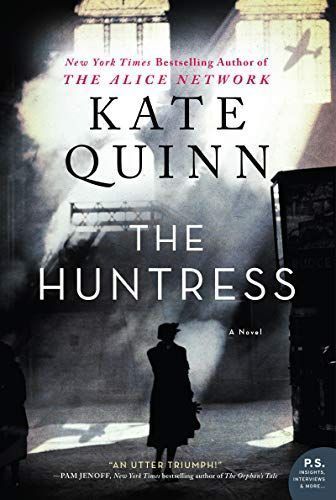
The Huntress A Novel
"...compulsively readable historical fiction…[a] powerful novel about unusual women facing sometimes insurmountable odds with grace, grit, love and tenacity.” - Kristin Hannah, The Washington Post Named one of best books of the year by Marie Claire and Bookbub “If you enjoyed “The Tattooist of Auschwitz,” read “The Huntress,” by Kate Quinn." The Washington Post From the author of the New York Times and USA Today bestselling novel, THE ALICE NETWORK, comes another fascinating historical novel about a battle-haunted English journalist and a Russian female bomber pilot who join forces to track the Huntress, a Nazi war criminal gone to ground in America. In the aftermath of war, the hunter becomes the hunted… Bold and fearless, Nina Markova always dreamed of flying. When the Nazis attack the Soviet Union, she risks everything to join the legendary Night Witches, an all-female night bomber regiment wreaking havoc on the invading Germans. When she is stranded behind enemy lines, Nina becomes the prey of a lethal Nazi murderess known as the Huntress, and only Nina’s bravery and cunning will keep her alive. Transformed by the horrors he witnessed from Omaha Beach to the Nuremberg Trials, British war correspondent Ian Graham has become a Nazi hunter. Yet one target eludes him: a vicious predator known as the Huntress. To find her, the fierce, disciplined investigator joins forces with the only witness to escape the Huntress alive: the brazen, cocksure Nina. But a shared secret could derail their mission unless Ian and Nina force themselves to confront it. Growing up in post-war Boston, seventeen-year-old Jordan McBride is determined to become a photographer. When her long-widowed father unexpectedly comes homes with a new fiancée, Jordan is thrilled. But there is something disconcerting about the soft-spoken German widow. Certain that danger is lurking, Jordan begins to delve into her new stepmother’s past—only to discover that there are mysteries buried deep in her family . . . secrets that may threaten all Jordan holds dear. In this immersive, heart-wrenching story, Kate Quinn illuminates the consequences of war on individual lives, and the price we pay to seek justice and truth.
Reviews
Elyse @elysejune
Patricia Nelson@tnelson577
Colleen@mirificmoxie
Kate B-L@librarycard
Katelyn Sykes@katelynsykes
marilynn@reganaldo
Cheri McElroy@cherimac
Livia@livinginsolitude
Karen Shimek@karenreads
Sahi K@sahibooknerd
Rina@lostcanticles
Kayla @kaylasbookishlife
Meagan Fowler@meaganfowler
Jeremy Cote@cote
Holly @mysticalbluerose
Bailley Leppert@bailleyleppert
Kathy Allatt@kathyall13
Abby Willett@abinator200
Catherine Mazeika@cama8991
Kate Allman@katec
Rochelle Butcher@rochelles_reading_journal
Pratik M@pcmhatre
Meredith McMillin@m_mcmillin
olivia campbell@okcampbell
Highlights
Holly @mysticalbluerose
Page 531
Holly @mysticalbluerose
Page 412
Holly @mysticalbluerose
Page 376
Holly @mysticalbluerose
Page 376
Holly @mysticalbluerose
Page 375
Holly @mysticalbluerose
Page 317
Holly @mysticalbluerose
Page 164
Holly @mysticalbluerose
Page 93
Holly @mysticalbluerose
Page 13